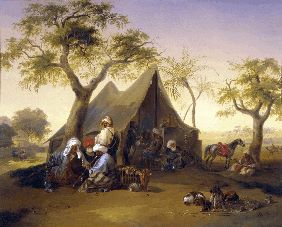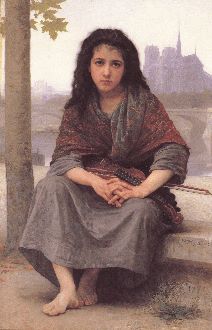Revisited
Words From National Character

|
Another name with a somewhat similar meaning is assassin, which most people would not guess to have ever been the name of a collection of people. An assassin is a person who arranges beforehand to take some one by surprise and kill him. But the original assassins were an Eastern people who believed that the murder of people of a religion other than their own was pleasing to their God. The Arabs first called this sect by the name hashshash, which the scholars of the Middle Ages translated into the Latin assassinus. The Arab name was given because these people were great eaters of "hashish" or dry herbs.  Painting "Arabs Drinking Coffee in Front of a Tent" The name Arab itself has come to be used with a special meaning which has nothing to do with the people whose name it is. A rough little boy who spends most of his time in the streets is described as a "street Arab," and this comes from the fact that we think of the Arabs as a wandering people. The "street Arab" is a wanderer also, of another sort. Another name of a wandering people has also come to have a special meaning in English. The French word for gipsy is bohemien, and from this we have the English word Bohemian. When we say a person is "a Bohemian," we mean that he lives in the way he really likes, and does not care whether other people think he is quite respectable or not. It was the novelist Thackeray who first used the word Bohemian in this sense. Bohemia is, of course, the name of a country in Germany, but it is also used figuratively to describe the region or community in which "Bohemian" or unconventional people live. The word gipsy itself is used to describe a very dark person, or almost any kind of people travelling round the country in caravans. But gipsy really means "Egyptian." When the real gipsies first appeared in England, in the sixteenth century, people thought they came from Egypt, and so gave them this name. Another name often given to very dark people is blackamoor, a name by which negroes are sometimes described. This really means "Black Moor," and shows us how confused the people who first used the word were about different races of people. The Moors were a quite different people from the negroes, being related to the Arabs. But to some people every one who is not white is a "nigger." Nigger comes, of course, from negro. The Moors inhabited a part of North-west Africa. It was also a North African people, the Algerians, who gave us the word Zouave. Every one has seen since the Great War began pictures of the handsome and quaintly-dressed French soldiers called "Zouaves." Perhaps some children wondered why they wore such a strange Eastern dress. It is because the Zouave regiments, which are now chiefly composed of Frenchmen, were originally formed from an Algerian mountain tribe called the Zouaves--Algeria being a French possession. The name is almost forgotten as that of a foreign tribe, but has become instead the name of these light infantry French regiments. In the Middle Ages scholars wrote in Latin, but poets and taletellers began to write in the language of the people the romance languages in France and Italy. The name of the most famous of Eastern nations now spread all over the world, the Jews, has become a term of reproach. For hundreds of years after the spread of Christianity over Europe the Jews were looked upon as a wicked and hateful people. In many countries they were not allowed to live at all; in others a portion of the towns was set apart for them, and they were allowed to live there because they were useful as money-lenders. Naturally the Jews, persecuted and distrusted, made as much profit as they could out of the people who treated them in this way. Perhaps with the growth of their wealth they grew to love money for its own sake. In any case, before long the Jews were looked upon as people who were decidedly ungenerous in the matter of money. Everybody knows the story of the Jew Shylock in Shakespeare's great play "The Merchant of Venice." Nowadays a person who is not really a Jew is often described contemptuously as a "Jew" if he shows himself mean in money matters; and some people even use a slang expression, "to jew," meaning to cheat or be very mean over a money affair. Another name of a nation which stands for dishonesty of another sort (and much more excusable) is Gascon. The Gascons are the natives of Gascony, a province in the south of France. It is proverbial among other Frenchmen that the Gascons are always boasting, and even in English we sometimes use the word Gascon to describe a great boaster, while gasconade is now a common term for a boastful story. Another word which we use to describe this sort of thing is romance. We often hear the expression, "Oh, he is only romancing," by which we mean that a person is saying what is not true, inventing harmless details to improve his story. The word romance has now many meanings, generally containing the idea of imagination. A person is called "romantic" when he or she is full of imaginings of great deeds and events. Or we say a person is a "romantic figure" when we mean that from his looks or speech, or from some other qualities, he seems fit for adventures.  Painting of a Bohemian woman But romance, from which we get romantic, was at first merely an adjective used to describe the languages which are descended from the Latin language, like French, Italian, and Spanish. In the Middle Ages scholars wrote in Latin, but poets and taletellers began to write in the language of the people--the romance languages in France and Italy. The tales of adventure and things which we should now call "romantic" were written in the "romance" languages; and from being used to describe the language, the word came to be used to describe the kind of story contained in these poems and tales. Gradually the words romantic and romance got the meaning which they have to-day. We have seen in another chapter that we have a number of words taken from the names of persons in ancient history. We have also a modern and special use of words formed from the names of some of the ancient nations. We saw that we use the word Spartan to describe any very severe discipline, or a person who willingly uses such discipline for himself. There are several other such names used in a more or less complimentary way. We speak of "Roman" firmness, and every one who has read Roman history will agree that this is a good use of the word. On the other hand, we have the expression "Punic faith" to describe treachery. The Romans had had many reasons for mistrusting their great enemy, the Carthaginians, and they used this expression, Fides Punica, which we have simply borrowed from the Latin. We use the expression "Attic (or Athenian) salt" to describe a very refined wit or humour. The Romans used the word sal, or "salt," in this sense of wit, and their expression sal Atticum shows the high opinion they had of the Athenians, from whom, indeed, they learned much in art and in literature. It is this same expression which we use to-day, having borrowed and translated it also from the Latin. We speak of a "Parthian shot" when some one finishes a conversation or an argument with a sharp or witty remark, leaving no chance for an answer. This expression comes from the story of the Parthians, a people who lived on the shores of the Caspian Sea, and were famous as good archers among the ancient nations. The way in which the names of nations and peoples have taken on more general meanings gives us many glimpses into history. |
| Revisited - Words From National Character | ||||
| Writer: | Elizabeth O'Neill | |||
| Images: | ||||
| ||||
| Sources: | ||||
| ||||
All images are Copyright - CC BY-SA (Creative Commons Share Alike) by their respective owners, except for Petey, which is Public Domain (PD) or unless otherwise noted.
comments powered by Disqus



















